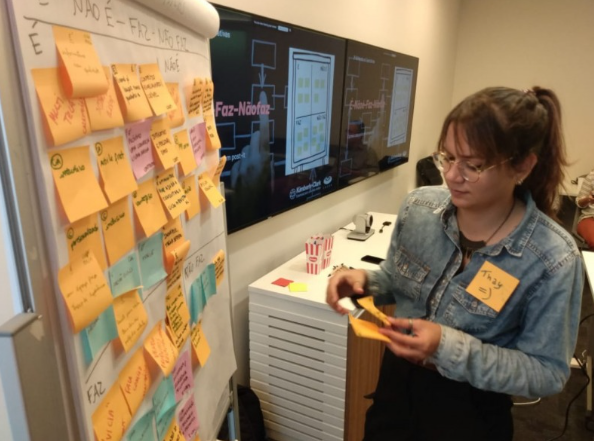Women make up 52.2% of Brazil’s population, and according to the 2021 Femtech Landscape Report, they are 75% more likely than men to use digital tools for healthcare. Even though there are still taboos to overcome, people increasingly discuss menstruation with more openness. In this context, there is a growing demand for information and technologies related to menstruation.
In 2021, Intimus, the Kimberly-Clark brand specializing in feminine care and a leader in the sanitary pad category, launched Kira, a content platform that brings together information about women’s health, well-being, and sexuality. The platform results from the brand’s research to understand how girls and women approach and perceive intimate areas and what information they seek on this topic.
Kimberly-Clark and CESAR collaborated on part of this work between 2019 and 2020. The company approached the innovation center to prototype and validate some hypotheses regarding developing a digital solution related to menstruation. CESAR’s role was to answer the question: How could we add value to the solution so that the audience would choose Kimberly-Clark’s technology over others in the market?
“CESAR provided us with the methodology and knowledge to start from the consumer’s perspective, truly centered on their needs, and through the use of design techniques, arrive at the best product concept that would add value for these girls and women with whom we want to interact.” – Silvio Veloso, Director of Digital Transformation at Kimberly-Clark Brazil.
How was the solution built?
To investigate the acceptance of the target audience, a team of designers from CESAR delved into three sets of hypotheses presented by the company: e-commerce, conversation, and menstrual calendar.
The process began with an immersion stage during an alignment workshop. Then, to segment audiences and define personas, a secondary research phase followed based on publications about the subject and what was already documented by the client. In addition to a series of interviews, it also developed and applied an online questionnaire.
From there, the team worked on value propositions to understand these individuals’ journeys and pain points. The diversity of profiles considered in the research and validation phase was one of the project’s major challenges: it was a broad group composed of women from various age groups and socioeconomic segments, considerably diverse, and with different goals.
Therefore, the project closely linked the constructed personas’ level of knowledge and affinity regarding one’s own body. Among the audience, CESAR identified groups of women who didn’t even track their menstruation, while others understood their menstrual cycle well. There were also groups paying attention to discussions on the subject, including topics related to the disposal of sanitary products and environmental concerns.
Ideation and Prototyping: the Challenges of a Broad Target Audience
Next came the ideation stage, with internal brainstorming, aiming to address each profile of the target audience identified. In this creative phase, Kimberly-Clark teams participated more directly, contributing information, experiences, and business insights while absorbing the research results presented by CESAR.
The team then created a list of features and modules, which went through two cycles of prototyping and validation with users. Starting from the product hypothesis, the design team needed to study and validate the audience’s acceptance. At the end of the process, in May 2020, the team delivered a concept app. Since the project’s goal was to understand the customers’ acceptance of the presented ideas, the technology was not developed in this stage.
With various modules, the solution combined information, a chatbot, consultations with a doctor, a menstrual calendar, and e-commerce, which responds to the user’s behavior based on their profile. In addition to the validated prototype, CESAR’s team provided a series of compelling ideas and solutions that the company could potentially develop later on.
“Many of the projects are not necessarily implemented by us. Our job is to validate the concept so that when it moves into the development phase, the proposal is already closer to the ideal because it has been tested and validated. The differentiating factor in our approach is this focus on the end customer, in the sense of truly understanding them and proposing solutions that can add value.” – Thayssa Lacerda, a designer from CESAR who worked on the Kimberly-Clark project.

Kira: Digital Solution Launched by Kimberly-Clark
Kira is part of Kimberly-Clark’s digital transformation process and serves as a consumer engagement platform. The tool aims to function as a mutual dialogue ecosystem with the audience. The app allows consumers to register for free and provides access to a personalized menstrual calendar, an online store with products from the Intimus portfolio, and editorial content with information about intimate health and sexuality.

